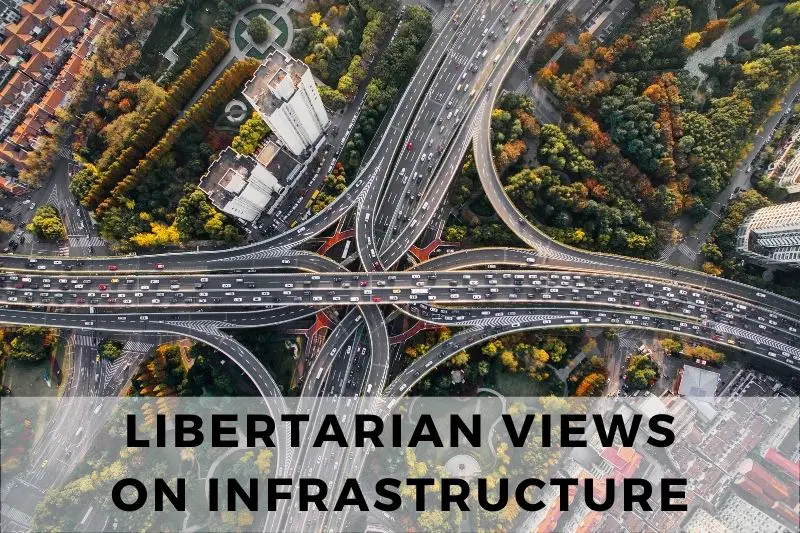
Infrastructure plays a crucial role in the functioning of society, encompassing everything from transportation networks to communication systems and utilities. Libertarian views on infrastructure advocate for minimal government involvement, emphasizing privatization, user fees, and voluntary solutions.
This approach stems from the belief in limited government intervention and the importance of individual freedom and property rights. However, this perspective has faced criticisms regarding issues such as universal access, market failures, and social justice concerns.
Understanding libertarian views on infrastructure is essential for exploring alternative perspectives on how infrastructure should be managed and funded.
Libertarian Views on Infrastructure
Infrastructure is a critical component of any society, providing the foundation for economic activity, social interaction, and overall well-being. Libertarian views on infrastructure are shaped by principles of limited government intervention, individual freedom, and market-based solutions. Here are key aspects of libertarian views on infrastructure:
#1. Privatization
In tune with Libertarian view on government, Libertarians often advocate for the privatization of infrastructure, arguing that private ownership leads to more efficient management and allocation of resources. Private companies, motivated by profit, are incentivized to innovate and improve infrastructure quality. For example, a privately-owned toll road may be better maintained and managed than a publicly-owned road, as the private company has a direct financial incentive to keep the road in good condition to attract more users.
#2. Limited Government Involvement
Libertarians believe that government involvement in infrastructure should be minimal. They argue that government tends to be inefficient and bureaucratic, leading to higher costs and lower quality services. Instead of government spending, libertarians advocate for the free market to determine infrastructure development, with competition driving efficiency and innovation. For instance, rather than government agencies deciding which roads to build or repair, private companies would compete to provide the best services at the lowest cost.
#3. User Fees
A common libertarian approach is to fund infrastructure through user fees. This means that those who use the infrastructure pay for its construction and maintenance, rather than relying on general taxation. User fees can ensure that the costs of infrastructure are borne by those who benefit from it, rather than being spread across the entire population. For example, a toll bridge may be funded and maintained through tolls collected from drivers who use the bridge, rather than through taxes paid by all citizens.
#4. Voluntary Solutions
Libertarians prefer voluntary, market-based solutions for infrastructure development. They believe that individuals and communities can voluntarily come together to fund and build infrastructure projects, without government coercion.
For instance, a group of homeowners might band together to pay for the construction of a neighborhood park, rather than relying on government funding. This approach allows for flexibility and innovation, as projects can be tailored to meet the specific needs and preferences of the individuals involved.
#5. Property Rights
Property rights are central to libertarian views on infrastructure. Libertarians argue that individuals have the right to own and control their property, including infrastructure, and that this leads to better outcomes than government ownership.
Protecting property rights ensures that individuals have the incentive to maintain and improve their property, leading to more efficient use of resources. For example, a privately-owned water treatment plant may be more efficient and reliable than a publicly-owned plant, as the private owner has a direct stake in ensuring its proper operation.
#6. Decentralization
Decentralization is key in libertarian views on infrastructure. They believe that decisions regarding infrastructure should be made at the local level, where individuals are more familiar with their own needs and preferences.
Decentralization allows for greater flexibility and responsiveness in infrastructure planning and development, as local communities can tailor projects to meet their specific needs.
For example, a city might choose to invest in public transportation infrastructure based on the unique commuting patterns of its residents, rather than relying on a one-size-fits-all approach mandated by a central government.
#7. Innovation and Technology
Libertarians believe that innovation and technology can play a significant role in improving infrastructure. They argue that private companies, driven by profit, are more likely to invest in new technologies that can enhance infrastructure efficiency and effectiveness.
For instance, a privately-owned energy company may invest in renewable energy technologies to reduce costs and environmental impact, whereas a government-owned company might be slower to adopt such technologies due to bureaucratic hurdles.
#8. Public-Private Partnerships
While wary of excessive government involvement, libertarians see value in public-private partnerships (PPPs) for infrastructure projects. PPPs can combine the efficiency of the private sector with the public interest goals of government, though libertarians emphasize the need for transparency and accountability in such arrangements.
For example, a PPP for the construction of a new highway might involve a private company financing and building the highway, with the government overseeing the project to ensure that it meets public safety and environmental standards.
Criticisms of Libertarian Approaches to Infrastructure
While libertarian views on infrastructure offer a unique perspective, they also face several criticisms. Critics argue that these approaches may lead to various challenges and issues. Here are some of the key criticisms:
#1. Lack of Universal Access
One of the main criticisms of libertarian approaches to infrastructure is that they may lead to a lack of universal access. Privatization and user fees could result in some individuals being unable to afford essential services like transportation or utilities. This could exacerbate inequality and limit economic opportunities for those with lower incomes. For example, a privately-owned toll road may become prohibitively expensive for low-income individuals to use, limiting their access to jobs and services.
#2. Market Failures
Critics argue that relying solely on market forces to determine infrastructure development may lead to market failures. For example, in areas with low population density, private companies may be unwilling to invest in infrastructure projects due to limited profit potential. This could result in underserved or neglected communities. In such cases, government intervention may be necessary to ensure that essential infrastructure is provided to all citizens, regardless of profitability.
#3. Long-term Sustainability
There are concerns about the long-term sustainability of infrastructure under libertarian approaches. Without government intervention, there may be insufficient investment in maintenance and upkeep, leading to deteriorating infrastructure over time. This could result in higher costs and safety risks in the future. For instance, a privately-owned water treatment plant may cut costs by neglecting maintenance, leading to water contamination and health hazards.
#4. Inequality and Social Justice Concerns
Critics also raise concerns about the potential for increased inequality and social justice issues under libertarian approaches. Privatization and user fees may disproportionately affect marginalized communities, leading to further social and economic disparities. For example, a privately-owned healthcare system may prioritize services for those who can afford to pay, leaving marginalized communities without access to essential medical care.
#5. Infrastructure Monopolies
There are concerns that privatization could lead to infrastructure monopolies, where a single company controls essential services in a particular area. This could result in higher prices, lower quality services, and reduced competition. For example, a single private company owning all the roads in a city could charge exorbitant tolls, limiting access to transportation for many residents.
#6. Lack of Government Oversight and Regulation
Critics argue that libertarian approaches to infrastructure may lead to a lack of government oversight and regulation. This could result in environmental degradation, unsafe working conditions, and other negative consequences that could harm society as a whole. For instance, without government regulation, a privately-owned energy company may pollute the environment or endanger workers to cut costs, leading to negative impacts on public health and safety.
These criticisms highlight the complexity of infrastructure development and the challenges of balancing individual freedom with the need for accessible, sustainable, and equitable infrastructure systems.
Closing Thoughts
Understanding libertarian views on infrastructure provides valuable insights into alternative approaches to managing and funding essential services. While these views emphasize individual freedom and limited government intervention, they also face criticisms regarding universal access, market failures, and long-term sustainability.
Balancing these perspectives is crucial for developing infrastructure systems that are accessible, sustainable, and equitable for all members of society. By considering a range of viewpoints and engaging in constructive dialogue, we can work towards infrastructure solutions that meet the needs of diverse communities while respecting individual rights and freedoms.
